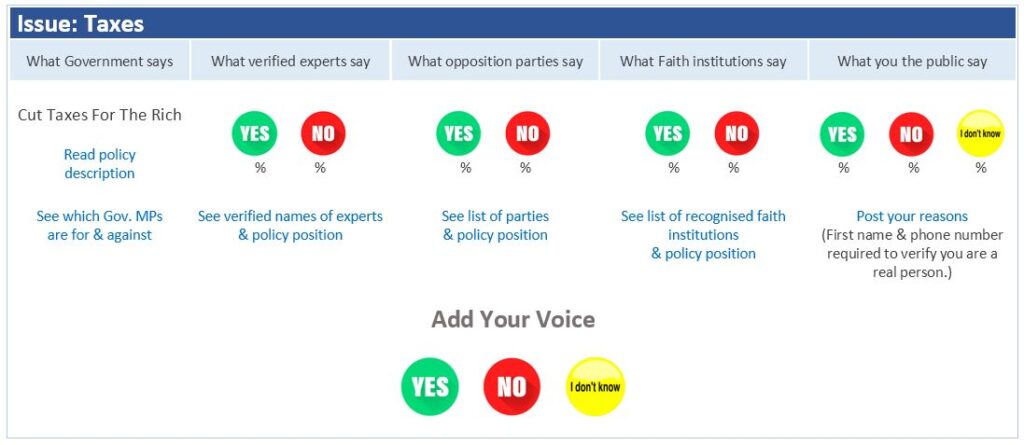The problem with writing in a vacuum is you simply do not know how far off the mark you are, as there is no one to judge the plausibility and more or less sanity of any idea you examine.
For this reason I have tried to warn the friendly visitor that there may, from time to time, be the occasional wild speculation. It is up to the visitor to decide whether what follows qualifies.
Below is a grand, master framework for strengthening democratic government. The purpose is to quickly inform the citizen on various opinions regarding important government policy decisions, helping navigate through the competing views on offer, sifting through them to weed out the purely politically motivated from among those informed by knowledge, science and guiding principles other than ideology.
Faith institutions are included not because I have a faith or because I have faith in the faith institutions themselves. It is simply because they are players, though also acknowledging that some of them have begun to adopt humanist and scientific rather than religious principles, adding of course that usually they have been forced to do this to maintain their credibility.

Explanation of the Citizen’s Referendum Platform
It is difficult to get a quick, clear and complete picture of the various opinions surrounding a particular government policy, especially if it is fraught with ideological divisiveness, complexity and/or lack of data.
Non-governmental positions can provide important information that is sometimes obscured or lost, in large part due to the brevity (the problem of “concision”) or perhaps even total absence of media exposure to the public.
A swift overall view of various non-governmental positions on a particular policy issue can be had by collecting and presenting data as in the image above.
Citizens can consult this representation of broad opinion to help inform them more fully on a particular issue. They can also “vote” on the issue, adding their voice to public opinion.
To help avoid bias, the order in which different bodies of opinion appear, as well as the Yes, No and Don’t Know icons, randomly alternate for different policy issues. For example, for the current (Tory) government’s proposal to remove the cap on banker’s bonuses, the order of bodies of opinion could be: Faiths, Opposition Parties, Experts; and the icon order might be: No, Yes. The icons in the “public” column could also alternate, as might those in the public voting area at the bottom.
The platform would be non-profit, run by volunteers, transparent, and open to scrutiny.
Such a resource may not count for much among committed conspiracy theory followers, who are perhaps unreachable through such means. But it may provide others who do not have the time to consult reputable news sources, yet trust experts, with an accurate snapshot of alternative positions, empowering citizens to make informed decisions. This counters the dominance of narrow political ideology backed by the authority of the incumbent government, bringing in opinion from sources with a much broader base of guiding principles (science, ethics and common sense).
To an extent, such a platform would also go some way towards countering the bias found even in highly reputable news outlets such as the BBC, (though Channel 4 possibly may not require this safeguard).
Are there volunteers who could help build such a platform? Assuming it does not qualify as WS.